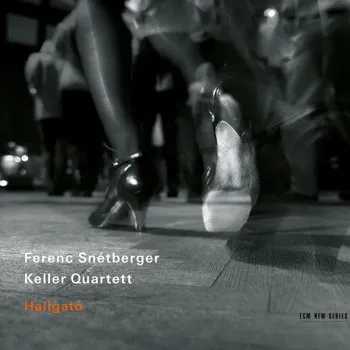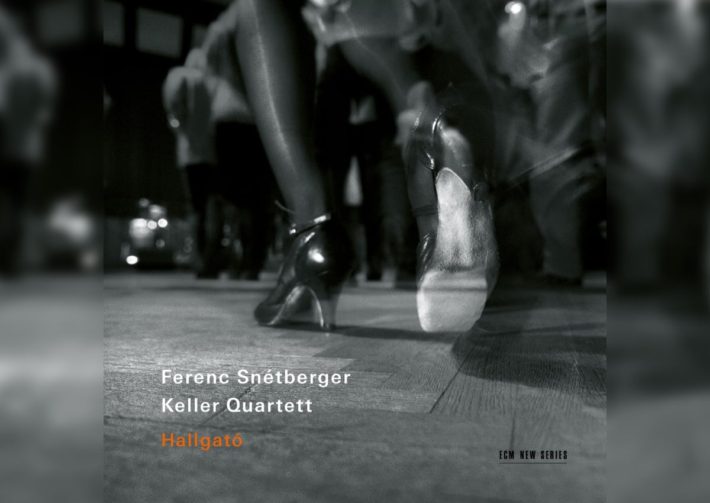Guitarist and composer Ferenc Snétberger collaborates with the Keller Quartet in a live concert of his own works and those by Shostakovich, Dowland, and Barber. All the pieces center around a message of commemoration, giving us a view into its many different forms.

Snétberger wrote his Concerto for Guitar and Orchestra, “In Memory of My People” (1994-5), as a remembrance of the 50th anniversary of the Holocaust’s end. Here we have an arrangement from the original score to guitar and string quartet. Hallgató (track 1), equal parts jazz and Hungarian folk music, has improvisation at its heart. The guitar solos are lengthy (the first one alone taking up almost a third of the entire movement), but the performance doesn’t make us feel that way. The instrument’s pleasing, full-bodied sound really seems to fill out the concert space nicely. Additionally, Snétberger’s fluid rubatos successfully do just what his composition intends, which is to express a prevalent melancholy.
However, the element of freedom keeps the interpretation from becoming overly dark or one-sided. When the folk appears in the middle of the movemetn, it is somewhat unexpected, but the orchestra’s tasteful approach doesn’t make it seem out of place. Tánc (track 3) is quite impressive: the fast-paced exchanges between Snétberger and the orchestra give birth to the movement’s energetic and highly rhythmic drive; it also speaks to a fine precision in their collaboration. Although the ensemble has more of a melodic presence here than in Hallgató, the guitar’s elegant virtuosity is not diminished.
Shostakovich’s C minor quartet reveals a more macabre side of commemoration. The Keller Quartet’s interpretation effectively shows both a sardonic detachment from grief and a frighteningly angry commentary on it. The noticeably dry and austere D-S-C-H motif that opens the first movement (track 4) is different from the Pavel Hass Quartet’s, whose legato lines for me add a preferably smoother and more refined tone (see review). That’s not to say that the Keller Quartet’s approach isn’t good, particularly when we consider the overall path of the movement: the intermittent moments of lyricism in the latter half have just the right bit of poignancy to balance out the astringency.
The briskness and clarity of the second movement, despite its stridence, brings out urgent madness that only increases in intensity (to this end, the accelerando toward the end is quite well-done). The concluding Largo (track 8) provides a musical relief, if one might call it that, from the sharpness of the other movements. In some ways, it parallels the opening movement in the presence of imitative textures. But now, a murmuring 5-note motif and persistent cadential movement signify inevitability. The ensemble, too, replaces the unrest of the D-S-C-H motif with a funereal presence, helping us to understand the quartet’s conclusion as a reconciliation and a surrender.
Samuel Barber’s Adagio for Strings (track 11) is a compelling choice to describe two sides of commemoration: anguish and beauty. It originated as the second movement of his Op. 11 String Quartet (1936), but was eventually adapted for string orchestra by the composer and premiered by Toscanini in 1938. Although listeners may feel the gravitas of the work is best captured through the sweeping density of the full orchestra, the original version evokes a more intimate lament. Managing a suitable tempo for this piece is undoubtedly tricky and the range in other recorded versions is quite wide. Unfortunately, I found the quartet’s pacing too fast to really savor Barber’s breathtaking writing and the violin, while rich, occasionally too present. The evocation is not all lost, though: the quartet does uphold the winding character of the melody in a way that makes it constantly climb and reach toward the peak. The cello line at 2:38 is lovely: simultaneously meditative but laden with tangible feeling, it illuminates the work’s sensitivity.
The recording engineering is faithful but does little to minimize background noise from the live performance. If we’re able to overlook small missteps, however, there is much to appreciate in the efforts by Snétberger and the Keller Quartet, and a lot to enjoy from this original program.
“Hallgató“
Ferenc Snétberger – Concerto for Guitar and Orchestra, “In Memory of My People” (version for guitar and string quartet), Rhapsody No. 1
Shostakovich – String Quartet No. 8 in C Minor
John Dowland – Two songs (arr. for guitar and string quartet)
Samuel Barber – Adagio for Strings (from String Quartet Op. 11)
Ferenc Snétberger – Guitar
Keller Quartet
ECM, CD 3519395



















